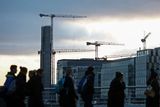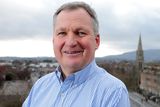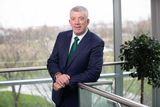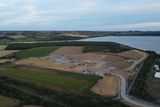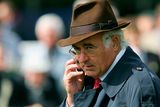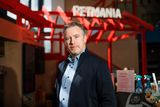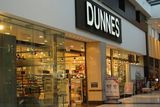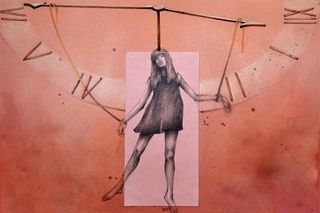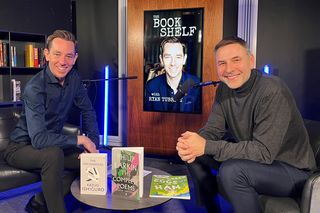When I joined Ryanair it was a complete mess - Howard Millar, outgoing CFO
After two decades with Ryanair, former finance boss Millar is ready for take-off
Howard Millar: 'I want to keep my finger in the pie.'
Howard Millar gets up from his seat and rifles through a filing cabinet in his office at Ryanair's colourful new HQ. He knows exactly what he's looking for and slaps an ageing document triumphantly on the small round table.
"This my personal copy," he says, opening the Ryanair flotation prospectus from 1997. It's a dramatic reminder of how much the airline has grown in less than 20 years.
Millar, who joined Ryanair in April 1992 and will leave his executive role at the end of this year for (as yet unknown) pastures new, turns the page to his favourite piece of nostalgia.
A map inside shows Ryanair's network at the time: 13 routes between Ireland and the UK, one domestic UK route, and two routes from Ireland to continental Europe.
"Scheduled to commence in June 1997," notes the prospectus, are services between Kerry and Stansted, and Stansted to Stockholm (liberal geographical repositioning means Sweden has been shunted about 600km west and 400km south to include it in the graphic).
Today, Ryanair flies over 1,600 routes across Europe, its tentacles stretching from Skelleftea (your starter for 10) to Gran Canaria, from Shannon to Paphos.
And for Millar (53), who started with the airline as financial controller before being made deputy chief executive and chief financial officer in 2003 (that role had been held by Michael Cawley, who became chief operating officer), the numbers tell the story.
Revenue in 1996 was just £110m (€140m) and net profit was £13m (€16m). In its last financial year, Ryanair generated revenue of €5bn and a €523m net profit.
It wasn't always so, of course. When Millar joined the airline he quickly realised it was a mess - short on cash, shy on book-keeping and flirting with oblivion.
From that, to an airline that within the past 18 months has ordered almost 400 aircraft from Boeing with a list price of $37bn (€29bn), has over €4bn in cash on its books, and is aiming to fly 150 million passengers a year within a decade.
When Millar joined, Ryanair still had business class, a frequent flier programme, and was still giving free meals in front of the curtain. "I remember one of the management meetings: a passenger had found a snail in their salad and what were we going to do about it," he says.
"It was a complete mess. There were good people here but we were just really struggling. Aer Lingus were on our back, hammering down," he recalls. "They were ahead of us, they were working with the government. We were getting screwed everywhere."
At one stage in its relative infancy, Aer Lingus even made a play to buy Ryanair, with the late Tony Ryan having put a £35m (€44m) price tag on it.
"The first couple of years were very rough. There was literally no money here," says Millar, who had only really taken the job because he'd been living in Saudi Arabia for four years previously with his wife and they wanted to get back to Ireland.
Straight from Trinity College in 1982 where he studied business, Millar (who grew up in Santry and whose father had his own business equipment sales firm) worked for Renault Ireland, handling its leasing business. He left there in 1988 for Saudi Arabia, working for Irish farming group Masstock. In 1977, Masstock had formed a joint venture with Saudi firm Almarai to establish desert dairy farms .
"It was tax-free money," says Millar. "I learned a huge amount. I was maybe 27 and running four milk-processing plants, and a distribution operation that was distributing to 16,000 shops across the Middle East and had 300 delivery trucks." He then went into group finance operations at the business.
Conor Hayes (who in 2012 retired as RTE's finance boss) had been chief financial officer at the Saudi operation and had recruited Millar. Hayes left to become Ryanair chief executive in 1991 and then poached Millar to join him.
At Ryanair, two watershed events had happened early on, Millar points out. One was the opening of Stansted Airport in 1991, which provided a "credible offering" for London. The second was the decision to buy Boeing 737s - the aircraft that became Ryanair's workhorse and now the only aircraft type in its fleet.
"Boeing gave us a $27.5m loan to buy six aircraft, which were pretty old at that stage, but in fairness Boeing stuck their ass on the line," says Millar.
"We had to come up with $2.5m. It gave us reliable aircraft and gave us a plane that was 30pc larger (than the BACs it had been using). We went from 100 seats to 130 seats. We still had two pilots, the same number of cabin crew, ground handling agents - so you got a shot in the arm in terms of your cost base."
The early part of the 1990s also marked the full-time arrival of Michael O'Leary, who took over as ceo in 1994, having been deputy ceo since 1991 (he'd been on the board since the late '80s). He had been parachuted in by Tony Ryan, for whom he had been working as a personal assistant, to try and salvage the business (O'Leary famously advised Ryan to shut it down).
"I was here one evening in 1993 and I saw Michael sitting at a desk at the same floor I was on," remembers Millar. "He was there with his dictating machine going through stuff. He used to come in in the evening time and was here full-time from 1993. I found him fascinating. I'd never met anyone like him before."
O'Leary, Millar and Michael Cawley (who resigned earlier this year and remains a non-executive director), came to form the triumvirate at the core of the airline for two decades.
The 1996 investment by US billionaire David Bonderman in Ryanair and the launch of Easyjet in 1995 helped to legitimise Ryanair's business. "It became fashionable," says Millar, who recalls the "smear campaign" by various competitors that dogged Ryanair for years.
Along the way, there have been huge profits, failed efforts to buy Aer Lingus, spats with everyone from governments to travel agents, a conversion from the brash, couldn't-car- less style to a much softer image and a change in strategy to drive future growth.
But as time passed, Millar's eyes drifted to the throne. He wondered if O'Leary would ever step back and give someone else - say, a chief financial officer - a chance at running it. The scenarios played out in his head: "Perhaps David Bonderman might step down as chairman and Michael might become chairman, he might want to do something else, but you never knew. I suppose myself and Michael Cawley had thought there's a chance that he might have said he wasn't interested in it any more, or wanted to be chairman and then you'd get your chance. But that didn't happen."
Millar even thought that getting married and having kids might prompt O'Leary to ease back.
"Then he went the opposite way," jokes Millar, "and said he'd be spending more time in the office and I said, ah, f**k."
"I came to the realisation that with the new transformed Ryanair that he had just got so enthused about it that in reality he wasn't going anywhere.
"It wasn't going to happen and my own working career is finite. I said to myself that I've had a great experience at Ryanair, a great run," he says of his decision to leave.
"In the last year the amount of stuff I've done - we've bought 380 aircraft, got a rating (from S&P, Fitch and Moody's), issued an €850m bond, the IT system - all the heavy duty stuff has been done. Could I have done another six or seven years? Easily. But you'd always asked yourself what if you had looked at something else, done something else."
Is he surprised O'Leary (who frequently says he's unemployable outside of Ryanair) has stayed for long? O'Leary recently signed up for another five years as chief executive. "No, I'm actually not," says Millar, a former FCA officer who was for years a keen rugby player (think Peter Stringer).
"I've worked with him very closely. He is intensely involved in this business. He might not know the exact detail on everything, but he knows how everything sits together. I would say there's not a chief executive in the airline industry who has as deep an understanding. He knows every aspect of the business inside out."
Asked if he, Cawley and O'Leary were socially involved outside of work, Millar says no, and that not being in each other's pockets like that is probably what helped them work together for so long. "I think it would have been far more difficult. Lots of tough decisions had to be made - going after Aer Lingus for instance."
Ah yes, Aer Lingus. Three failed take-overs, €407m of Ryanair cash (admittedly, it equates to less than 10pc of the cash it has stockpiled now), endless legal battles and a near 30pc stake which Ryanair looks destined to be forced to sell most of following a UK competition ruling.
"We had a chat about it before the Aer Lingus IPO, around summer of 2006," he says. "Myself and the two Michaels sat down. We really started thinking about it and decided we'd go for it. We all took the view that we'd get one chance - we got two more - and Aer Lingus was doing a lot of good things at the time."
"We knew there'd be a s**t storm," he says of the backlash from government and the public. "We briefed the board a night or two before the IPO (in September 2006)."
"We were able to rationalise it even on the second and third times. Even on asset play, it was still good value."
But there are other things to occupy Ryanair now: that transformation of its image and strategy, for instance. "We became rules-based," admits Millar.
But didn't those rules come from management? "Yeah, we set the rules and we pushed people to implement them and if you didn't implement them we penalised you. The buck has to stop somewhere. Management made those decisions, but we absolutely went too far."
He says that two profit warnings in quick succession - and Easyjet's buoyant financial performance - spurred management to do something. "We could see that the excess baggage take was rising, people were being caught for €50 at the gate, the grief we were getting on the boarding card reissue thing - all of these things were cumulative," explains Millar.
"One of the things that really pushed us was Easyjet [see below]" he says.
"The transformation in the last year in the softer, cuddlier, friendlier (approach) is going to have an enormous impact. It's going to be another turning point."
But Millar will watch much of the action from afar now, even though he'll take a seat on the Ryanair board from next summer. "My blood, sweat and tears are in here," he says. "I'm delighted I'm still going to be involved in Ryanair. It's very personal to me. It's very important that I leave it with a clean sheet. I'm leaving it in a pristine condition, very much unlike how I found it. I want to keep my finger in the pie."
'We looked at it and were too aggressive compared to Easyjet'
"We looked at it very closely and every month Easyjet's load factor rose and its average fare rose - for a company that was offering largely the same product," explains Millar of the genesis of Ryanair's decision to overhaul the way it engaged with customers, as well as its product offering.
"We just couldn't figure it out. We were very impressed with Easyjet because two years before Carolyn McCall joined as ceo (in 2010) it had been in a bad way."
"But by God did she turn it around," he says.
Ryanair has now overhauled its own website, targeted growth at primary airports, introduced family and business-friendly fare structures and put its tickets on global distribution systems as part of its revitalisation.
"We were trundling along. Our load factor was flat, our fares were slightly up or down, so we knew there was something going on," adds Millar. "We started to look more closely at how Easyjet was managing its fares and how it was pushing the whole customer relationship.
"Our product had got run down over a number of years. We were too aggressive. I think we've now fixed that."
He describes Easyjet's McCall as "presidential".
"I saw her being interviewed on Newsnight one time and she got a nice little run in, a few easy little questions. If we'd been on it we'd have got a stake through the heart."
Join the Irish Independent WhatsApp channel
Stay up to date with all the latest news



